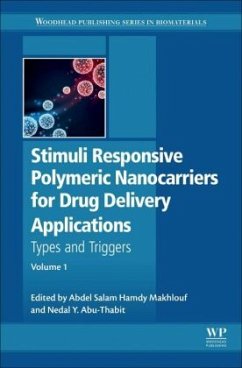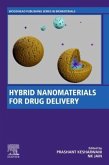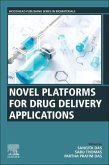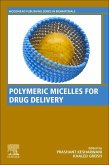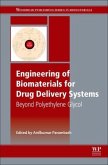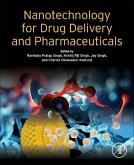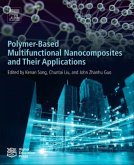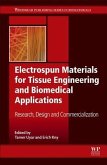Stimuli Responsive Polymeric Nanocarriers for Drug Delivery Applications
Volume 1: Types and triggers
Herausgegeben:Makhlouf, Abdel Salam Hamdy; Abu-Thabit, Nedal Yusuf
Stimuli Responsive Polymeric Nanocarriers for Drug Delivery Applications
Volume 1: Types and triggers
Herausgegeben:Makhlouf, Abdel Salam Hamdy; Abu-Thabit, Nedal Yusuf
- Gebundenes Buch
- Merkliste
- Auf die Merkliste
- Bewerten Bewerten
- Teilen
- Produkt teilen
- Produkterinnerung
- Produkterinnerung
Stimuli Responsive Polymeric Nanocarriers for Drug Delivery Applications, Volume One: Types and Triggers discusses, in detail, the recent trends in designing biodegradable and biocompatible single-responsive polymers and nanoparticles for safe drug delivery. Focusing on the most advanced materials and technologies, evaluation methods, and advanced synthesis techniques stimuli-responsive polymers, the book is an essential reference for scientists with an interest in drug delivery vehicles. Sections focus on innovation, development and the increased global demand for biodegradable and…mehr
![Hybrid Nanomaterials for Drug Delivery Hybrid Nanomaterials for Drug Delivery]() Hybrid Nanomaterials for Drug Delivery164,99 €
Hybrid Nanomaterials for Drug Delivery164,99 €![Novel Platforms for Drug Delivery Applications Novel Platforms for Drug Delivery Applications]() Novel Platforms for Drug Delivery Applications198,99 €
Novel Platforms for Drug Delivery Applications198,99 €![Polymeric Micelles for Drug Delivery Polymeric Micelles for Drug Delivery]() Polymeric Micelles for Drug Delivery173,99 €
Polymeric Micelles for Drug Delivery173,99 €![Engineering of Biomaterials for Drug Delivery Systems Engineering of Biomaterials for Drug Delivery Systems]() Engineering of Biomaterials for Drug Delivery Systems157,99 €
Engineering of Biomaterials for Drug Delivery Systems157,99 €![Nanotechnology for Drug Delivery and Pharmaceuticals Nanotechnology for Drug Delivery and Pharmaceuticals]() Nanotechnology for Drug Delivery and Pharmaceuticals113,99 €
Nanotechnology for Drug Delivery and Pharmaceuticals113,99 €![Polymer-Based Multifunctional Nanocomposites and Their Applications Polymer-Based Multifunctional Nanocomposites and Their Applications]() Polymer-Based Multifunctional Nanocomposites and Their Applications128,99 €
Polymer-Based Multifunctional Nanocomposites and Their Applications128,99 €![Electrospun Materials for Tissue Engineering and Biomedical Applications Electrospun Materials for Tissue Engineering and Biomedical Applications]() Electrospun Materials for Tissue Engineering and Biomedical Applications193,99 €
Electrospun Materials for Tissue Engineering and Biomedical Applications193,99 €-
-
-
- Produktdetails
- Woodhead Publishing Series in Biomaterials
- Verlag: Elsevier Science & Technology / Woodhead Publishing
- Artikelnr. des Verlages: C2016-0-00601-0
- Englisch
- Abmessung: 35mm x 152mm x 229mm
- Gewicht: 1230g
- ISBN-13: 9780081019979
- Artikelnr.: 50428652
- Woodhead Publishing Series in Biomaterials
- Verlag: Elsevier Science & Technology / Woodhead Publishing
- Artikelnr. des Verlages: C2016-0-00601-0
- Englisch
- Abmessung: 35mm x 152mm x 229mm
- Gewicht: 1230g
- ISBN-13: 9780081019979
- Artikelnr.: 50428652
Part Two: Endogenous and exogenous stimuli-responsive drug delivery systems 3 The smart chemistry of stimuli-responsive polymeric carriers for target drug delivery applications 4. Enzyme-responsive polymers for drug delivery and molecular imaging 5. pH-responsive polymers for drug delivery applications 6. Magnetically responsive polymers for drug delivery applications
Part Three: Polymeric nanocarriers for stimuli-responsive drug delivery systems 7. Responsive block copolymers for drug delivery applications. Part 1: Endogenous stimuli-responsive drug-release systems 8. Responsive block copolymers for drug delivery applications. Part 2: Exogenous stimuli-responsive drug-release systems 9. Responsive polyelectrolyte multilayer nanofilms for drug delivery applications 10. Responsive polyelectrolyte complexes based on natural polysaccharides for drug delivery applications 11. Responsive polymer nanoparticles for drug delivery applications 12. Stimulus-responsive nanogels for drug delivery 13. Stimuli-responsive polymeric hydrogels and nanogels for drug delivery applications
Part Four: Biopolymer and biodegradable nanocarriers for stimuli-responsive drug delivery systems 14. Bioinspired polymeric carriers for drug delivery applications 15. Stimuli-responsive biopolymer nanocarriers for drug delivery applications 16. Responsive polymer-biomacromolecule conjugates for drug delivery 17. Responsive biopolymer-based microgels/nanogels for drug delivery applications 18. Stimuli-responsive poly(e-caprolactone)s for drug delivery applications 19. Responsive polysaccharides and polysaccharides-based nanoparticles for drug delivery 20. Responsive cyclodextrins as polymeric carriers for drug delivery applications 21. Chitosan as responsive polymer for drug delivery applications 22. Biodegradable polyhydroxyalkanoates nanocarriers for drug delivery applications 23. Biodegradable polymeric micelles for drug delivery applications
Part Two: Endogenous and exogenous stimuli-responsive drug delivery systems 3 The smart chemistry of stimuli-responsive polymeric carriers for target drug delivery applications 4. Enzyme-responsive polymers for drug delivery and molecular imaging 5. pH-responsive polymers for drug delivery applications 6. Magnetically responsive polymers for drug delivery applications
Part Three: Polymeric nanocarriers for stimuli-responsive drug delivery systems 7. Responsive block copolymers for drug delivery applications. Part 1: Endogenous stimuli-responsive drug-release systems 8. Responsive block copolymers for drug delivery applications. Part 2: Exogenous stimuli-responsive drug-release systems 9. Responsive polyelectrolyte multilayer nanofilms for drug delivery applications 10. Responsive polyelectrolyte complexes based on natural polysaccharides for drug delivery applications 11. Responsive polymer nanoparticles for drug delivery applications 12. Stimulus-responsive nanogels for drug delivery 13. Stimuli-responsive polymeric hydrogels and nanogels for drug delivery applications
Part Four: Biopolymer and biodegradable nanocarriers for stimuli-responsive drug delivery systems 14. Bioinspired polymeric carriers for drug delivery applications 15. Stimuli-responsive biopolymer nanocarriers for drug delivery applications 16. Responsive polymer-biomacromolecule conjugates for drug delivery 17. Responsive biopolymer-based microgels/nanogels for drug delivery applications 18. Stimuli-responsive poly(e-caprolactone)s for drug delivery applications 19. Responsive polysaccharides and polysaccharides-based nanoparticles for drug delivery 20. Responsive cyclodextrins as polymeric carriers for drug delivery applications 21. Chitosan as responsive polymer for drug delivery applications 22. Biodegradable polyhydroxyalkanoates nanocarriers for drug delivery applications 23. Biodegradable polymeric micelles for drug delivery applications

